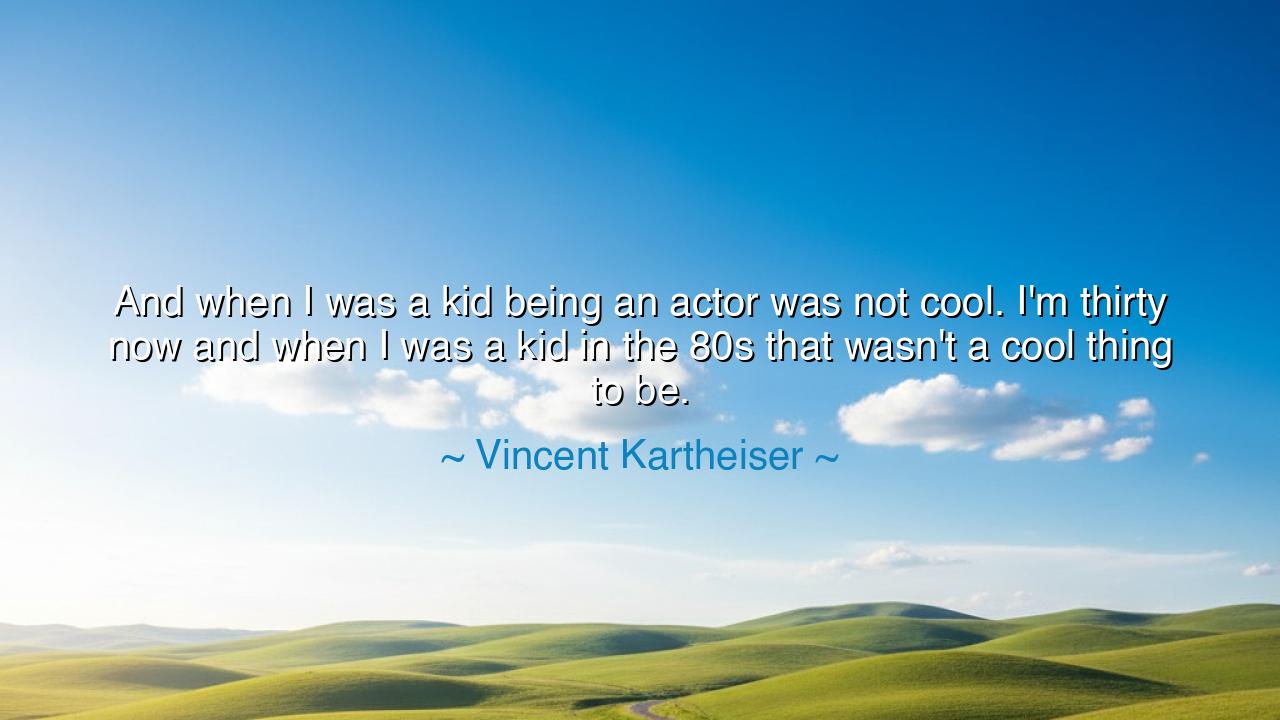
And when I was a kid being an actor was not cool. I'm thirty now
And when I was a kid being an actor was not cool. I'm thirty now and when I was a kid in the 80s that wasn't a cool thing to be.






In the days of ancient wisdom, the stories of the past were often told by those who dared to stand apart from the ordinary paths, those who followed their own callings, who chose to walk roads less traveled by others. The artist, the poet, the singer, the warrior—each role was seen differently by the world around them, but all shared a common truth: to pursue one's true passion often meant defying the prevailing expectations of society. In these words of Vincent Kartheiser, we hear the echo of this timeless truth: “And when I was a kid, being an actor was not cool. I’m thirty now, and when I was a kid in the 80s, that wasn’t a cool thing to be.”
What Kartheiser reveals is the deep tension between society's perception of what is valued and the individual's pursuit of their true path. In the 1980s, when acting was not seen as a noble pursuit, those who chose the stage over the crowd, the artist over the ordinary worker, often faced ridicule or isolation. The role of the actor was not yet elevated in the eyes of many; it was seen as a fancy or an escape, not a serious profession or calling. And yet, even in the face of this societal resistance, there were those like Kartheiser who saw the beauty in the art of acting, who knew that being true to one’s passion was worth far more than the fleeting approval of others.
This struggle between individuality and society's expectations is not new. Long before the modern age, in ancient Greece, philosophers and artists faced similar challenges. The famous playwright Sophocles, whose works are still celebrated today, lived in a time when the role of the artist was not always respected, and yet he chose to pursue his craft with such dedication that he forever changed the course of dramatic literature. Like Kartheiser, Sophocles chose the path of passion over the conventional—and, in doing so, created a legacy that would be remembered for millennia.
There are countless examples in history of individuals who defied society’s notions of what was “cool” or “respectable,” only to be vindicated by time. Consider the story of Vincent van Gogh, whose art was ridiculed during his lifetime, yet whose paintings are now considered some of the most valuable and iconic in the world. In the age of the 80s, when the world may have looked upon the dream of becoming an actor with skepticism, Kartheiser too was sowing the seeds of a personal legacy—one that, over time, would blossom into a successful career, respected and celebrated in a world that had, by then, come to see acting as an art form, worthy of admiration.
Kartheiser's reflection serves as a reminder that society’s judgments are often fleeting, and that the pursuit of one’s true calling is a long-term journey that requires courage in the face of ridicule and patience in the face of doubt. Just as the ancient philosophers told their students to seek knowledge for its own sake, so too should we follow our inner compass, regardless of the temporary rejection we may face from the world around us. True greatness is not about conformity; it is about being true to oneself and creating something meaningful despite the judgment of others.
The lesson here is profound: never let the opinions of others define your worth. Whether it is the artist, the actor, the philosopher, or the dreamer, the path to greatness is often paved with the stones of resistance and criticism. Yet, it is those who stay true to their vision who will ultimately shape the future. Kartheiser's words remind us that what is not cool today may well become the mark of greatness tomorrow.
In your own life, be unwavering in the pursuit of what calls to you, whether the world understands it or not. Know that society's judgments are temporary, but the legacy of your actions can last forever. Stand firm like those who have come before you—Sophocles, van Gogh, and Kartheiser—and walk your path with courage, knowing that true fulfillment comes from following your own calling, no matter how the world may view it. Your dream is yours alone to nurture, and in time, the world will see its value.






AAdministratorAdministrator
Welcome, honored guests. Please leave a comment, we will respond soon